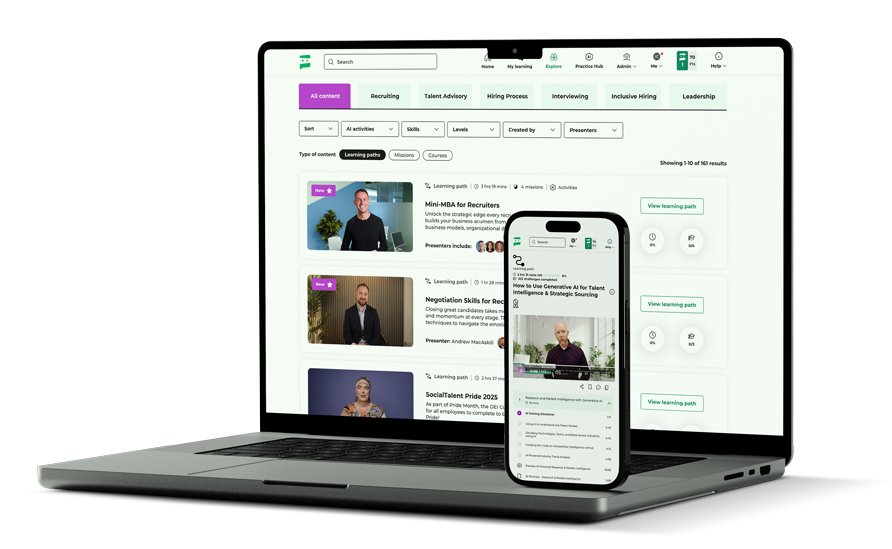
By David Deady
Great hiring is integral to business success. No matter the external circumstances, people will always be the biggest asset and differentiator for any organization. Talent is the lifeblood that sustains innovation, performance, and growth. So, finding (and retaining) the right teams will see organizations thrive. But, make bad hiring decisions and the foundations of success inevitably chip-away and crumble.
According to McKinsey, 82% of Fortune 500 executives don’t believe that their companies recruit highly talented people. And of the minority that do, only 7% think they can actually keep them. It’s interesting that a function like hiring, which, as we have discussed, is so keenly linked to the strength of a business, is often siloed away to a small core. Traditionally seen as a the job of Talent Acquisition or HR, it generally represents the concerns of a few, rather than being a priority for the organization as a whole.

What is the Alternative Approach?
The future of recruitment should be considerably more holistic. SocialTalent’s CEO and Co-Founder, Johnny Campbell, has always said that “hiring is a team sport.” And he’s right. It’s up to everyone – from leadership and Talent Acquisition to Hiring Managers, HR, and the employee base at large – to be engaged, informed, and aligned on this front. The function of hiring should permeate the DNA of an organization. It needs to become a shared goal for every stakeholder, rather than just being “someone else’s” responsibility.
Essentially what companies need to be advocating for is the creation of a culture of hiring.
Learn more: Hiring as a Team Sport, with Johnny Campbell
What is a Hiring Culture?
In the same way that company culture embodies the values, expectations, and practices of the workforce, a hiring culture refers to this same established and collective approach to how your organization recruits. Essentially, everyone in the company is vested in the process of hiring great talent, and it becomes a strategic priority. There’s an understanding that whether you play a direct role in hiring or not, you are still active in your awareness that having the best talent is linked to long-term business success. Even the late Steve Jobs recognized how vital it was, stating in 1996 that he considers “the most important job of someone like [himself] is recruiting.”
To bring it into further perspective Kelly Jones, Chief People Officer at Cisco, even likens hiring cultures to the fanaticism of CrossFit:
Why is Establishing a Hiring Culture Important?
According to Greenhouse’s Workplace Intelligence Report, 48% of business leaders feel that talent-related challenges are their most important concern. So it’s well documented that hiring the best is directly linked to strategic success. And when everyone has skin in the game, you reduce your risk of making a bad hire – something that is so costly, even beyond finances. But when everyone involved in the hiring journey is aligned, engaged, and shares a common purpose, this can help drive so many other benefits as well, such as:
- Improving the drive for diversity and inclusion
- Reducing bias
- Creating a better candidate experience
- Boosting employer brand
- And ultimately, helping you hire the best candidates
By ensuring that you have buy-in and alignment on what good hiring looks like across the board, you increase your chance of finding and recruiting the right people for your team and business. And with this talent in place, you enable your company to become more agile, innovative, and competitive, extremely important traits in a post-pandemic world.
Learn more: What is the Real Cost of a Bad Hire
How Can I Learn More About Hiring Cultures?
Establishing strong hiring principles and building a hiring culture from the top down has never been more important. But so many organizations struggle to inculcate and sustain a model that reflects this. So in light of this, we’re delighted to announce that our next online event, SocialTalent Live: How to Build a Hiring Culture, will help you address these concerns!

During this webinar you will learn how top-performing companies integrate hiring as a core value from the C-suite to the front lines, driving better outcomes and sustainable growth. Discover what a truly successful hiring culture looks like, the key steps to build it, and practical advice on where to begin. And hear from industry leaders who’ve mastered this approach, sharing real-world insights, actionable strategies, and the hurdles they’ve overcome.
Our speakers and panelists included:
- John Vlastelica, CEO and Founder, Recruiting Toolbox
- Nick Mailey, Former VP of Integrated Talent Solutions, Equinix
- Danielle Monaghan, Global HR/TA Executive, Expedia Group
- Johnny Campbell, CEO and Co-Founder, SocialTalent
We can’t wait to see you on November 20th – for more information and to save your spot, click the link below!


